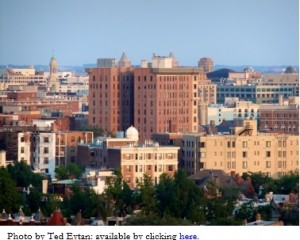As part of her clear commitment to affordable housing, Mayor Bowser should act soon to strengthen a program that does an amazing thing — producing low-cost housing throughout the city without requiring a single tax dollar! The DC Council wants to improve the city’s Inclusionary Zoning program, but that requires Mayor Bowser to take the first step.
 Inclusionary Zoning changes would help it generate more affordable housing and serve more of the DC households most in need of low-cost housing. Since IZ is tied to private housing development, which is exploding, making changes soon is important. Every day of delay is a lost opportunity.
Inclusionary Zoning changes would help it generate more affordable housing and serve more of the DC households most in need of low-cost housing. Since IZ is tied to private housing development, which is exploding, making changes soon is important. Every day of delay is a lost opportunity.
Here is how DC’s Inclusionary Zoning program works: It allows developers to build more housing in a given project than normal zoning rules allow. That “density bonus” offers the potential to make more money. In return, developers must set aside some of the new housing — currently 8-10 percent — as affordable to moderate-income households. IZ creates mixed-income housing, without local tax dollars, in places across the city where new development is occurring. Inclusionary Zoning helps low- and moderate-income families benefit from growth in the city.
There are key ways to strengthen DC’s IZ program, as highlighted in a resolution introduced by the DC Council this month.
- More Affordable Housing: IZ requires that 8 percent to 10 percent of units in a new building be set aside as affordable. This is lower than in five programs in other communities, where set-asides are 15 percent to 20 percent, according to an Urban Institute analysis. DC should look at ways to increase the affordable housing set aside of IZ projects.
- Help Inclusionary Zoning Serve More Lower-Income Households: The original goal of DC’s IZ program was to produce a mix of homes affordable to families with incomes of around $45,000 for a family of two (50 percent of Area Median Income) and $70,000 (80 percent of AMI). But most of the homes built to date are at the higher income limit. IZ can be modified to better achieve the original goal.
It’s an important time to strengthen Inclusionary Zoning. Private-market housing development is booming in the District, with a record number of permits for 4,200 homes issued in 2014. Yet none of this housing is likely to be affordable without IZ. With DC’s rising rents, there is now virtually no low-cost housing left in the private market, according to a recent DCFPI analysis.
Improving Inclusionary Zoning will require Mayor Bowser to take the lead. IZ rules are set by the DC Zoning Commission, and the mayor Bowser can submit proposed changes to IZ, through the Office of Zoning, but the DC Council cannot. The Council’s move to express support for Inclusionary Zoning improvements, through a resolution, is helpful, but it’s not enough.
Mayor Bowser, who has shown strong support for affordable housing through her first budget, should take the further step to increase affordable housing options for DC residents by strengthening Inclusionary Zoning.
To print a copy of today’s blog post, click here.
